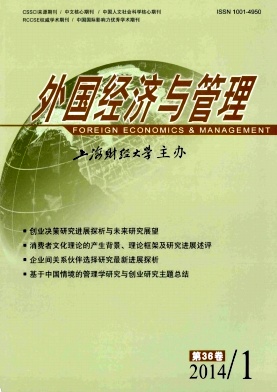创业者经验研究回顾与展望
外国经济与管理 2014 年 第 36 卷第 01 期, 页码:12 - 19
摘要
参考文献
摘要
创业者的经验是影响新企业成功创建和发展的重要因素,这方面的研究不断得到深化,但是,现有的相关研究基于不同的理论而呈现出视角多元化的格局。本文围绕创业者经验这个主题,对现有相关研究进行了系统的梳理,并基于资源、认知、学习、情感等四个视角对相关研究进行了述评。最后,剖析了现有研究仍存在的不足,构建了一个创业者经验研究整合框架,并指出了创业者经验研究的未来发展方向。
[1]Beasley M,et al.Resilience in response to life stress:The effects of coping style and cognitive hardiness[J].Personality and Individual Differences,2003,34(1):77-95.
[2]Bhagavatula S,et al.How social and human capital influence opportunity recognition and resource mobilization in India’s handloom industry[J].Journal of Business Venturing,2010,25(3):245-260.
[3]Colombo M G and Grilli L.Founders’human capital and the growth of new technology-based firms:A competence-based view[J].Research Policy,2005,34(6):795-816.
[4]Cope J.Entrepreneurial learning from failure:An interpretative phenomenological analysis[J].Journal of Business Venturing,2011,26(6):604-623.
[5]Clarysse B,et al.The impact of entrepreneurial capacity,experience and organizational support on academic entrepreneurship[J].Research Policy,2011,40(8):1084-1093.
[6]Davidsson P and Honig B.The role of social and human capital among nascent entrepreneurs[J].Journal of Business Venturing,2003,18(3),301-331.
[7]Farmer S M,et al.The behavioral impact of entrepreneur identity aspiration and prior entrepreneurial experience[J].Entrepreneurship Theory and Practice,2011,35(2):245-273.
[8]Holcomb T R,et al.Architecture of entrepreneurial learning:Exploring the link among heuristics,knowledge,and action[J].Entrepreneurship Theory and Practice,2009,33(1):167-192.
[9]Kolb D A.Experiential learning:Experience as the source of learning and development[M].Engle-wood Cliffs,NJ:Prentice Hall,1984:67-69.
[10]Li H Y and Zhang Y.The role of managers’political networking and functional experience in new venture performance:Evidence from China’s transition economy[J].Strategic Management Journal,2007,28(8):791-804.
[11]Lumpkin G T and Lichtenstein B B.The role of organizational learning in the opportunity-recognition process[J].Entrepreneurship Theory and Practice,2005,29(4):451-472.
[12]Mitchell R K,et al.Inside opportunity formation:Enterprise failure,cognition,and the creation of opportunities[J].Strategic Entrepreneurship Journal,2008,2(3):225-242.
[13]Newbert S L.New firm formation:A dynamic capability perspective[J].Journal of Small Business Management,2005,43(1):55-77.
[14]Petkova A P.A theory of entrepreneurial learning from performance errors[J].International Entrepreneurship and Management Journal,2009,5(4):345-367.
[15]Politis D.The process of entrepreneurial learning:A conceptual framework[J].Entrepreneurship Theory and Practice,2005,29(4):399-424.
[16]Rerup C.Learning from past experience:Footnotes on mindfulness and habitual entrepreneurship[J].Scandinavian Journal of Management,2005,21(4):451-472.
[17]Sarasvathy S D.Causation and effectuation:Toward a theoretical shift from economic inevitability to entrepreneurial contingency[J].Academy of management Review,2001,26(2):243-263.
[18]Shane S and Venkataraman S.The promise of entrepreneurship as a field of research[J].Academy of Management Journal,2000,25(1):217-226.
[19]Shepherd D A,et al.New venture survival:Ignorance,external shocks,and risk reduction strategies[J].Journal of Business Venturing,2000,15(5):393-410.
[20]Shepherd D A.Learning from business failure:Propositions of grief recovery for the self-employed[J].Academy of Management Review,2003,28(2):318-328.
[21]Shepherd D A and DeTienne D R.Prior knowledge,potential financial reward,and opportunity identification[J].Entrepreneurship Theory and Practice,2005,29(1):91-112.
[22]Stinchcombe A L.Social structure and organizations[J].Advances in Strategic Management,2000,17(2):229-259.
[23]Tornikoski E T and Newbert S L.Exploring the determinants of organizational emergence:A legitimacy perspective[J].Journal of Business Venturing,2007,22(2):311-315.
[24]Ucbasaran D,et al.Opportunity identification and pursuit:Does an entrepreneur’s human capital matter?[J].Small Business Economics,2008,30(2):153-173.
[25]Ucbasaran D,et al.The extent and nature of opportunity identification by experienced entrepreneurs[J].Journal of Busi-ness Venturing,2009,24(2):99-115.
[26]Ucbasaran D,et al.The nature of entrepreneurial experience,business failure and comparative optimism[J].Journal of Business Venturing,2010,25(6):541-555.
[27]Zhang J F.The advantage of experienced start-up founders in venture capital acquisition:evidence from serial entrepreneurs[J].Small Business Economics,2011,36(2):187-208.
[28]Zheng Y F.Unlocking founding team prior shared experience:A transactive memory system perspective[J].Journal of Business Venturing,2012,27(5):577-591.
[2]Bhagavatula S,et al.How social and human capital influence opportunity recognition and resource mobilization in India’s handloom industry[J].Journal of Business Venturing,2010,25(3):245-260.
[3]Colombo M G and Grilli L.Founders’human capital and the growth of new technology-based firms:A competence-based view[J].Research Policy,2005,34(6):795-816.
[4]Cope J.Entrepreneurial learning from failure:An interpretative phenomenological analysis[J].Journal of Business Venturing,2011,26(6):604-623.
[5]Clarysse B,et al.The impact of entrepreneurial capacity,experience and organizational support on academic entrepreneurship[J].Research Policy,2011,40(8):1084-1093.
[6]Davidsson P and Honig B.The role of social and human capital among nascent entrepreneurs[J].Journal of Business Venturing,2003,18(3),301-331.
[7]Farmer S M,et al.The behavioral impact of entrepreneur identity aspiration and prior entrepreneurial experience[J].Entrepreneurship Theory and Practice,2011,35(2):245-273.
[8]Holcomb T R,et al.Architecture of entrepreneurial learning:Exploring the link among heuristics,knowledge,and action[J].Entrepreneurship Theory and Practice,2009,33(1):167-192.
[9]Kolb D A.Experiential learning:Experience as the source of learning and development[M].Engle-wood Cliffs,NJ:Prentice Hall,1984:67-69.
[10]Li H Y and Zhang Y.The role of managers’political networking and functional experience in new venture performance:Evidence from China’s transition economy[J].Strategic Management Journal,2007,28(8):791-804.
[11]Lumpkin G T and Lichtenstein B B.The role of organizational learning in the opportunity-recognition process[J].Entrepreneurship Theory and Practice,2005,29(4):451-472.
[12]Mitchell R K,et al.Inside opportunity formation:Enterprise failure,cognition,and the creation of opportunities[J].Strategic Entrepreneurship Journal,2008,2(3):225-242.
[13]Newbert S L.New firm formation:A dynamic capability perspective[J].Journal of Small Business Management,2005,43(1):55-77.
[14]Petkova A P.A theory of entrepreneurial learning from performance errors[J].International Entrepreneurship and Management Journal,2009,5(4):345-367.
[15]Politis D.The process of entrepreneurial learning:A conceptual framework[J].Entrepreneurship Theory and Practice,2005,29(4):399-424.
[16]Rerup C.Learning from past experience:Footnotes on mindfulness and habitual entrepreneurship[J].Scandinavian Journal of Management,2005,21(4):451-472.
[17]Sarasvathy S D.Causation and effectuation:Toward a theoretical shift from economic inevitability to entrepreneurial contingency[J].Academy of management Review,2001,26(2):243-263.
[18]Shane S and Venkataraman S.The promise of entrepreneurship as a field of research[J].Academy of Management Journal,2000,25(1):217-226.
[19]Shepherd D A,et al.New venture survival:Ignorance,external shocks,and risk reduction strategies[J].Journal of Business Venturing,2000,15(5):393-410.
[20]Shepherd D A.Learning from business failure:Propositions of grief recovery for the self-employed[J].Academy of Management Review,2003,28(2):318-328.
[21]Shepherd D A and DeTienne D R.Prior knowledge,potential financial reward,and opportunity identification[J].Entrepreneurship Theory and Practice,2005,29(1):91-112.
[22]Stinchcombe A L.Social structure and organizations[J].Advances in Strategic Management,2000,17(2):229-259.
[23]Tornikoski E T and Newbert S L.Exploring the determinants of organizational emergence:A legitimacy perspective[J].Journal of Business Venturing,2007,22(2):311-315.
[24]Ucbasaran D,et al.Opportunity identification and pursuit:Does an entrepreneur’s human capital matter?[J].Small Business Economics,2008,30(2):153-173.
[25]Ucbasaran D,et al.The extent and nature of opportunity identification by experienced entrepreneurs[J].Journal of Busi-ness Venturing,2009,24(2):99-115.
[26]Ucbasaran D,et al.The nature of entrepreneurial experience,business failure and comparative optimism[J].Journal of Business Venturing,2010,25(6):541-555.
[27]Zhang J F.The advantage of experienced start-up founders in venture capital acquisition:evidence from serial entrepreneurs[J].Small Business Economics,2011,36(2):187-208.
[28]Zheng Y F.Unlocking founding team prior shared experience:A transactive memory system perspective[J].Journal of Business Venturing,2012,27(5):577-591.
引用本文
汤淑琴, 蔡莉, 陈彪. 创业者经验研究回顾与展望[J]. 外国经济与管理, 2014, 36(1): 12–19.
导出参考文献,格式为:
下一篇:创业者身份及其建构研究述评





 8364
8364  704
704

